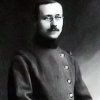Max Stirner

Max Stirner
Johann Kaspar Schmidt, better known as Max Stirner, was a German philosopher. He is often seen as one of the forerunners of nihilism, existentialism, psychoanalytic theory, postmodernism, and anarchism, especially of individualist anarchism. Stirner's main work is The Ego and Its Own, also known as The Ego and His Own. This work was first published in 1845 in Leipzig, and has since appeared in numerous editions and translations...
NationalityGerman
ProfessionPhilosopher
Date of Birth25 October 1806
CountryGermany
For what reason then do the realists show themselves so unfriendly toward philosophy? Because they misunderstand their own calling and with all their might want to remain restricted instead of becoming unrestricted! Why do they hate abstractions? Because they themselves are abstract since they abstract from the perfection of themselves, from the elevation of redeeming truth!
Then the necessary decline of non-voluntary learning and rise of the self-assured will which perfects itself in the glorious sunlight of the free person may be somewhat expressed as follows: knowledge must die and rise again as will and create itself anew each day as a free person.
The men of the future will yet fight their way to many a liberty that we do not even miss.
We do not aspire to communal life but to a life apart.
Property exists by grace of the law. It is not a fact, but a legal fiction.
If it is right for me, it is right. It is possible that it is wrong for others: let them take care of themselves!
A race of altruists is necessarily a race of slaves. A race of free men is necessarily a race of egoists.
The people’s good fortune is my misfortune!
The freedom of man is, in political liberalism, freedom from persons, from personal dominion, from the master; the securing of each individual person against other persons, personal freedom.
Everything sacred is a tie, a fetter.
The people is dead! Good-day, Self!
From the moment when he catches sight of the light of the world, a man seeks to find out himself and get hold of himself out of its confusion, in which he, with everything else, is tossed about in motley mixture.
Man has not really vanquished Shamanism and its spooks till he possesses the strength to lay aside not only the belief in ghosts or in spirits, but also the belief in the spirit.
Every State is a despotism, be the despot one or many.